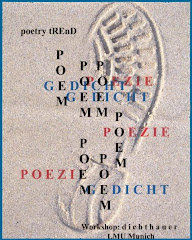Over the last few years, I have been observing how translation is increasingly coming to be considered as a separate literary art - growing in importance in universities and other higher learning institutions. And given the complexity of an increasingly transnational world, we need more and more translation. Indeed, we are more and more dependent on it for helping us overcome language barriers. My experience of being translated by Barbara Oberhauser, Maria Luise Schlay and Aprilia Zank, with biographical notes from Judith Koniger makes me wish I had more facility with German. At the same time, it is amazing how one feels an 'osmosis effect' - a merging between languages. Thank you very much.
Most poets know that reading writers from other cultures adds to the overall quality, range and depth of their work. Indeed, I feel all should at least attempt to translate a few poems in order to experience the challenge..They will gain insights and facility. Of course, they will need to have some contact with the language/poet being translated or at least with a person who speaks the 'other' language in order to make progress with the sounds, music, sense, vocabulary.and form. There is some consolation in that every attempt at a translation is a 'version' of some kind.
Occasionally, one hears people say that poetry is the most difficult genre to translate?? Perhaps, but therein lies the challenge.
Katherine Gallagher
London. November, 2008
.jpg)